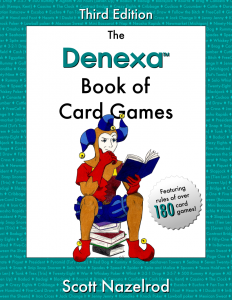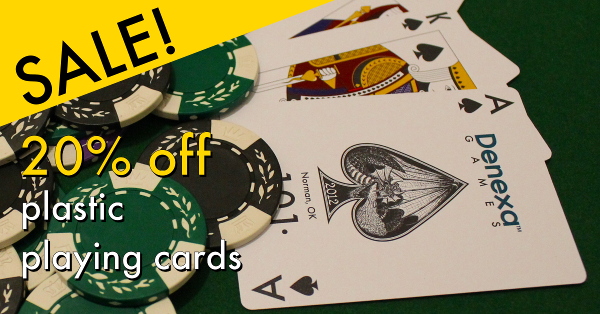Irregularities and how to handle them in your card games
In any card game, mistakes sometimes happen in dealing or the course of play. Cards get dropped, decks sometimes have the wrong number of cards, and hands sometimes get discarded by accident. All mistakes like this are, as a general group, called irregularities.
As the host, it’s your job to decide how to handle any irregularities that occur in your game. It’s important, especially in games like poker with money involved, to know how to handle them in a fair and consistent way. Ruling one way in one situation and a different way when it happens again engenders distrust from your players. That means some of them may not come back the next time you host a game. If you stick to the same rules, your players will play confident in the knowledge that they will be treated fairly in such a situation.
The resolutions recommended here are based on Bob Ciaffone’s “Robert’s Rules of Poker”, the governing document of modern poker. If your players have played in a casino poker game, they’ll appreciate having the situation resolved the same way it would be in the casino. Even if you’re not playing poker, these general rules will be helpful in a wide range of situations.
Misdeals
Any time that irregularities cause a hand to be abandoned and re-dealt, it is called a misdeal. When a misdeal occurs, the dealer gathers up the entire deck, including the players’ hands. The same dealer then shuffles and deals a new hand.
In most cases, a misdeal can only be declared at the beginning of a hand. After two players have acted on their hands, the opportunity to declare a misdeal ends. Regardless of what may have happened on the deal, the hand is played as usual from that point.
Dealer errors
Any of the following errors will result in a misdeal:
- Dealing the first card to the wrong position.
- Not dealing a hand to a player who is in the game.
- Dealing a hand to someone who isn’t in the game (or an empty seat).
- Dealing cards in the wrong order.
- Giving a player too many or too few cards, unless the players missing cards would simply get the next card(s) of the deck if the proper sequence were followed.
Exposed cards
If the dealer accidentally exposes the first or second card of the deal, this causes a misdeal. Should the dealer expose a card after this, and the game is one where the entire deck is not dealt out, the dealer completes the deal as usual, then replaces the exposed card with the top card of the stub. The exposed card is then placed in the discard pile, or as the bottom card of the stub, if the game doesn’t use a discard pile. (If the game starts each hand with one card in the discard pile, the exposed card will count as that card. In Texas Hold’em and Omaha, the exposed card is usually placed on top of the deck and is used as the first burn card.) In games that deal out the whole deck, or if the dealer exposes a second card, it causes a misdeal.
Players never have the option to accept an exposed card. Doing so is unfair to the players that did not have their cards exposed. It also encourages collusion between the dealer and the player.
If a player flashes one of their own cards after the deal is completed, they do not get a replacement. The card is still live. The player assumes all consequences of the other players’ knowledge of their card.
If a player intentionally shows cards to another active player, these cards must be shown to the entire table. This is to prevent that player from having an advantage. If the player shows cards to a player who is not currently in the game or to someone who isn’t playing, those cards must be shown to the other players at the end of the hand (or identified when they would be shown otherwise).
Boxed cards
A card that is turned opposite to the rest of the deck (i.e. it is face up when the rest of the deck is face down) is called a boxed card. If only one boxed card is found, it should simply be set aside. Boxed cards that get mistakenly dealt in error should be replaced at the end of the deal as if it were an exposed card. If the game requires that the entire deck be dealt, or a second boxed card is found, it causes a misdeal.
Incorrect and imperfect decks
We’ve discussed these before in “Incorrect and imperfect decks“, but here’s a refresher. Decks with damaged cards or cards identifiable from the back are called imperfect decks. Decks that have the wrong cards for the game being played are called incorrect decks. Every player has an obligation to point out that the deck has something wrong with it if it comes to their attention.
After the hand ends, the deck should be corrected, if possible. If not, a new deck should be substituted. Imperfect decks should always be replaced at the end of the hand.
Incorrect decks
If a card with a contrasting back design is discovered in the deck, the hand is void. The only exception is if the foreign card is found in the stub after dealing is complete, and is not part of the stock or any other place where it could potentially be put in play.
If a too many copies of a card (i.e. with the same rank and suit) are found in the deck, the deal is void. The scores are reset to what they were at the beginning of the hand, or any money placed in the pot is refunded.
In most cases, the deck having too few cards is not cause for concern. The deal is simply finished out as usual. However, if the game requires all cards to be present (because they are all dealt out initially or because every card is used at some point), when the number of cards is discovered to be inadequate, the hand is void, as if it had a foreign card or too many cards.
Extra cards (and jokers)
If a player discovers a joker or other card that simply doesn’t belong in the deck (like, say, a 2 in Pinochle), it is treated the same as if it were a boxed card. That is, the player should call attention to it and set it aside. The dealer should give the player a replacement card after the other cards have been dealt.
Dropped cards
If the dealer accidentally slides a card off the table, it should be treated the same as an exposed card. If a player drops their own card on the floor, the card is still live. In either case, the card should be recovered as quickly as possible.
Any dropped cards should be inspected for damage prior to being returned to play. It’s easy for cards on the floor to get stepped on and bent!
Incorrect and imperfect decks
Most card games rely on the fact that the exact composition of the deck is known, but the identity of any individual card may or may not be, depending on the role it is currently fulfilling in the game. Therefore, keeping the composition of the deck correct and cards indistinguishable from the back is vital to ensuring game balance and fairness to all players. Decks of cards which do not fulfill these requirements can be categorized as either incorrect or imperfect.
An incorrect deck is one with an incorrect composition for the game required. That is, if the game requires a standard 52-card deck, the deck must consist of ace through king in each of the four suits. Other games, such as Pinochle, require a different composition, which the deck must match to be considered correct. Incorrect decks are those which are either missing one or more card, or have somehow had extra cards included, usually because they were mixed in with cards from another, similar deck. Missing cards most frequently happen because they were accidentally left in the box or somehow found their way outside of the play area (e.g. by being dropped on the floor). In most games, when an incorrect deck is found to be in use, the deal is void. Collect all of the cards, correct the deck, if possible, and redeal. Any game play prior to the hand where the deck was found to be incorrect stands, however. If the deck cannot be corrected, because the missing cards have become lost, a new deck should be substituted.
An imperfect deck is a little more troublesome. That’s because imperfect decks include all other problems with a deck of cards that cannot be fixed by simply adding or removing cards. These include anything that makes the deck identifiable, such as printing defects or damage. If this is discovered in the middle of a hand, the hand continues, but for the sake of fairness, all players should be informed as to what the identifiable card is. After the hand ends, the deck is replaced.
You can avoid incorrect and imperfect decks being put into play by verifying the cards before game play starts. You can also guard against the cards becoming incorrect during game play by simply counting them to ensure the correct number is there between hands. If you use multiple decks of cards, ensure they have contrasting back designs (never use two blue decks, use one red and one blue).


